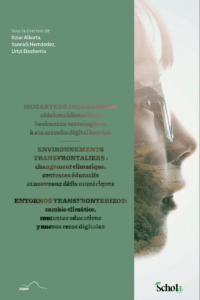UN@ est une plateforme d'édition de livres numériques pour les presses universitaires de Nouvelle-Aquitaine
Auteur : Nagore Dávila Cabanillas

Departamento de Geografía,
UPV/EHU,
Facultad de Letras,
Calle Tomas y Valiente, s/n
E–01006Vitoria-Gasteiz
nagore.davila@ehu.eus
0000-0002-4185-928X
geografia_upvehu
EhuGeografia
UPV/EHU,
Facultad de Letras,
Calle Tomas y Valiente, s/n
E–01006Vitoria-Gasteiz
nagore.davila@ehu.eus
0000-0002-4185-928X
geografia_upvehu
EhuGeografia
After graduating in Geography from the University of the Basque Country (UPV/EHU), Nagore Dávila Cabanillas completed her PhD in Geography in 2010 at the University of the Basque Country, supported by a predoctoral Research Training scholarship from the Basque Government. Her academic affiliation is within the Human Geography department of the University’s Department of Geography, Prehistory, and Archaeology. Here, she engages in both teaching and research roles. Currently, she serves as the coordinator for the second year of the Geography and Territorial Planning Degree and holds a position on the Permanent Commission as the coordinator of the Human Geography area. Additionally, she is a member of the Built Heritage Research Group and has actively contributed to various competitive research projects. Her research primarily focuses on territorial planning, specifically analyzing and evaluating different planning instruments across various territorial scales. Notably, her work in these areas has been published in several academic journals, including the Bulletin of the Association of Spanish Geographers. In recent years, she has begun to delve into research on topics related to residential segregation and territorial vulnerability concerning public policies.In terms of teaching, she has instructed courses in the Geography and Territorial Planning Degree, the Environmental Sciences Degree, and the Master’s Degree in Landscape Management: Heritage, Territory, and City, all at UPV/EHU.
References
- Dávila Cabanillas, N., & Aguado Moralejo, I., & Aranbarri Erkiaga, J. (2024). Project-based learning for the analysis and management of rural spaces: Proposal for adaptation measures against climate change. https://doi.org/10.21125/inted.2024.0318
- Dávila Cabanillas, N., & Aguado Moralejo, I., & Aranbarri Erkiaga, J. (2024). Innovative teaching for climate change and social vulnerability: Restructuring learning in geography. https://doi.org/10.21125/inted.2024.0319
- Dávila Cabanillas, N., & Aguado Moralejo, I. (2023). La planificación territorial frente al cambio climático. https://doi.org/10.7203/PUV-OA-627-3
- Aguado Moralejo, I., & Dávila Cabanillas, N. (2022). Aprendizaje basado en la investigación: aplicando tecnologías de la información geográfica al estudio de la segregación urbana. https://doi.org/10.26754/uz.978-84-18321-49-8
- Dávila Cabanillas, N., & Aguado Moralejo, I. (2022). Necesidad de integración de la política de vivienda en la planificación territorial de la Comunidad Autónoma del País Vasco para alcanzar un territorio no segregado. https://doi.org/10.26754/uz.978-84-18321-49-8
- Dávila Cabanillas, N. (2022). El medio rural en la planificación territorial de la CAPV. Dos áreas funcionales como estudio de caso en la categorización del suelo no urbanizable. http://www.ingeba.org/lurralde/
- Dávila Cabanillas, N. (2021). El patrimonio cultural en la planificación territorial de la Comunidad Autónoma del País Vasco. http://www.ingeba.org/lurralde/
Keywords
spatial planning, territorial planning instruments, landscape, residential segregation, spatial vulnerability
En el marco de los objetivos fijados para este curso de verano, esta comunicación pretende abordar la inclusión del cambio climático en la planificación territorial de un espacio transfronterizo.


